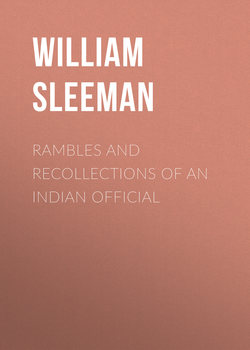Rambles and Recollections of an Indian Official

Реклама. ООО «ЛитРес», ИНН: 7719571260.
Оглавление
William Sleeman. Rambles and Recollections of an Indian Official
AUTHOR'S DEDICATION
EDITOR'S PREFACE (1893)1
EDITOR'S PREFACE (1915)
MEMOIR. OF. MAJ.-GEN. SIR WILLIAM HENRY SLEEMAN, K.C.B
BIBLIOGRAPHY. OF THE. WRITINGS OF. MAJOR-GENERAL SIR W. H. SLEEMAN, K.C.B
COMPARATIVE TABLE OF CHAPTERS
ABBREVIATIONS
RAMBLES AND RECOLLECTIONS
CHAPTER 1
CHAPTER 2
CHAPTER 3
CHAPTER 4
CHAPTER 5
CHAPTER 6
CHAPTER 7
CHAPTER 8
CHAPTER 9
CHAPTER 10
CHAPTER 11
CHAPTER 12
CHAPTER 13
CHAPTER 14
CHAPTER 15
CHAPTER 16
CHAPTER 17
CHAPTER 18
CHAPTER 19
CHAPTER 20
CHAPTER 21
CHAPTER 22
CHAPTER 23
CHAPTER 24
CHAPTER 25
CHAPTER 26
CHAPTER 27
CHAPTER 28
CHAPTER 29
CHAPTER 30
CHAPTER 31
CHAPTER 32
CHAPTER 33
CHAPTER 34
CHAPTER 35
CHAPTER 36
CHAPTER 37
CHAPTER 38
CHAPTER 39
CHAPTER 40
CHAPTER 41
CHAPTER 42
CHAPTER 43
CHAPTER 44
CHAPTER 45
CHAPTER 46
CHAPTER 47
CHAPTER 48
CHAPTER 49
CHAPTER 50
CHAPTER 51
CHAPTER 52
CHAPTER 53
CHAPTER 54
CHAPTER 55
CHAPTER 56
CHAPTER 57
CHAPTER 58
CHAPTER 59
CHAPTER 60
CHAPTER 61
CHAPTER 62
CHAPTER 63
CHAPTER 64
CHAPTER 65
CHAPTER 66
CHAPTER 67
CHAPTER 68
CHAPTER 69
CHAPTER 70
CHAPTER 71
CHAPTER 72
CHAPTER 73
CHAPTER 74
CHAPTER 75
CHAPTER 76
CHAPTER 77
APPENDIX
MAPS SHOWING AUTHOR'S ROUTE
Отрывок из книги
The Rambles and Recollections of an Indian Official, always a costly book, has been scarce and difficult to procure for many years past. Among the crowd of books descriptive of Indian scenery, manners, and customs, the sterling merits of Sir William Sleeman's work have secured it pre-eminence, and kept it in constant demand, notwithstanding the lapse of nearly fifty years since its publication. The high reputation of this work does not rest upon its strictly literary qualities. The author was a busy man, immersed all his life in the practical affairs of administration, and too full of his subject to be careful of strict correctness of style or minute accuracy of expression. Yet, so great is the intrinsic value of his observations, and so attractive are the sincerity and sympathy with which he discusses a vast range of topics, that the reader refuses to be offended by slight formal defects in expression or arrangement, and willingly yields to the charm of the author's genial and unstudied conversation.
It would be difficult to name any other book so full of instruction for the young Anglo-Indian administrator. When this work was published in 1844 the author had had thirty-five years' varied experience of Indian life, and had accumulated and assimilated an immense store of knowledge concerning the history, manners, and modes of thought of the complex population of India. He thoroughly understood the peculiarities of the various native races, and the characteristics which distinguish them from the nations of Europe; while his sympathetic insight into Indian life had not orientalized him, nor had it ever for one moment caused him to forget his position and heritage as an Englishman. This attitude of sane and discriminating sympathy is the right attitude for the Englishman in India.
.....
Most persons would, after examining this evidence, be tolerably well satisfied that the said tiger had really been killed at the time and place, and by the persons mentioned by A and B; but, to establish the fact judicially, it would be necessary to bring A, B, C, D, E, and F, the Nawāb of Rāmpur, the minister of the King of Oudh, and the goldsmith to the criminal court at Meerut, to be confronted with the person whose interest it was that A and B should not be believed. They would all, perhaps, come to the said court from the different quarters of the world in which they had thought themselves snugly settled; but the thing would annoy them so much, and be so much talked of, that sporting gentlemen, nawābs, ministers, and goldsmiths would in future take good care to have 'forgotten' everything connected with the matter in dispute, should another similar reference be made to them, and so A and B would never again have any chance.
Thug approvers, whose evidence we required, were employed in all parts of India, under the officers appointed to put down these associations; and it was difficult to bring all whose evidence was necessary at the trials to the court of the district in which the particular murder was perpetrated. The victims were, for the most part, money-carriers, whose masters and families resided hundreds of miles from the place where they were murdered, or people on their way to their distant homes from foreign service. There was no chance of recovering any of the property taken from the victims, as Thugs were known to spend what they got freely, and never to have money by them; and the friends of the victims, and the bankers whose money they carried, were everywhere found exceedingly averse to take share in the prosecution.
.....